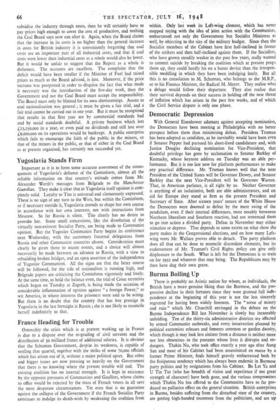Democratic Depression
With General Eisenhower adamant against accepting nomination, the Democrats have been meeting at Philadelphia with no better prospect before them than minimising defeat. President Truman has been adopted as candidate, as he inevitably would have been even if Senator Pepper had pursued his short-lived candidature and, with Justice Douglas declining nomination for Vice-President, that doubtful privilege has gone by acclamation to Senator Barkley of Kentucky, whose keynote address on Tuesday was an able per- formance. But it is too late now for platform performances to make any practical difference. Mr. Truman knows well that the next President of the United States will be Governor Dewey, and Senator Barkley that the next Vice-President will be Governor Warren. That, in American parlance, is all right by us. Neither Governor is anything of an isolationist, both are able administrators, and on aid for Europe they stand as firm as the present President and Secretary of State. After sixteen years' tenure of the White House the Democrats were doomed to defeat by the mere swing of the pendulum, even if their internal differences, most notably betweeen Northern liberalism and Southern reaction, had not sentenced them to go into action a divided party. Defeat in November may either stimulate or depress. That depends to some extent on what show the party makes in the Congressional elections, and on how many Left- wing votes Mr. Wallace proves able to detach. The party platform does all that can be done to reconcile discordant elements, but its endorsement of Mr. Truman's Civil Rights policy can give only displeasure to the South. What is left for the Democrats is to train on for 1952 and whatever that may bring. The Republicans may by then have dug their own grave.


































 Previous page
Previous page